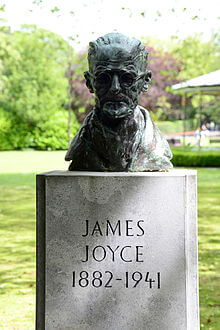Misyon Online - May-June 2017
From the Editor
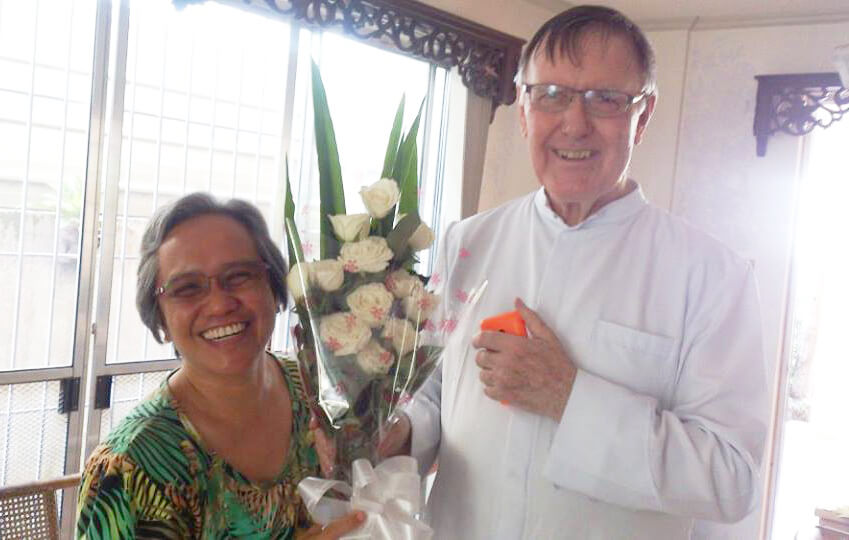
The new and the old editor on the latter’s most recent birthday
Your editor took over from the late Fr Niall O’Brien, the founding editor of MISYON, as it then was, a printed magazine, on 1 October 2002. However, the last issue that came out under Father Niall’s editorship was that of January-February 2003. In those days each issue was planned out well in advance and sent to the printers long before the date of publication.
March-April 2008 was the last printed issue of MISYON. Now it is MISYONonline.com and while deadlines still have to be met they are not quite as urgent as they used to be. That is what the current editor says, anyway, as he edits his final issue.
The new editor, Ms Arlenne Villahermosa, who takes over in June, is from Talisay City, Cebu, and joined the Columban Lay Missionaries in 2001. She went to Korea the following year and since then has served also in the Philippines and in Myanmar. She brings to her new job a wide experience of involvement in the mission of the Church, not only as a Columban Lay Missionary but also in the Archdiocese of Cebu. She brings too her experience of working in a bank and of teaching in the University of San Carlos, Cebu City.
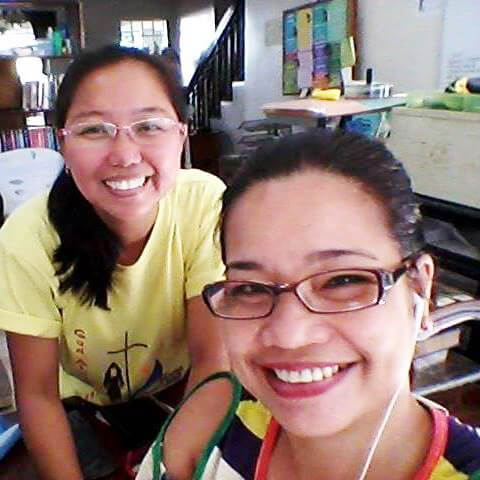
Mary Joy Rile and Anne B. Gubuan
Mrs Anne B. Gubuan, the assistant editor of MISYONonline.com, will also be leaving after nineteen years of service. Ms Mary Joy Rile, the editorial assistant, will continue on the editorial staff as the office moves to Manila. Anne has brought continuity, dedication and creativity to the magazine and, as she helped the current editor when he was new to the job, she has been helping Arlenne to prepare to take over. Joy will bring to Manila her wide knowledge of how the internet works, her insights as a teacher and her faith commitment.
The whole purpose of MISYONonline.com is to further the mission given by Jesus to the Church: ‘Go therefore and make disciples of all nations, baptizing them in the name of the Father and of the Son and of the Holy Spirit’ (Matthew 28:19). From its very beginnings a century ago the Missionary Society of St Columban has seen the importance of magazines where Columbans tell their stories of bringing the Gospel to the ends of the earth and stories of people accepting and living out the Good News of Jesus Christ, often heroically and in extremely difficult situations.
As Pope Francis frequently requests for himself, please pray for the editorial staff, with gratitude for the many blessings received from God since 1988 and for the many blessings that will be given in the years ahead.
In the Name of the Trinity, I am a Missionary
By Luda L. Egbalic
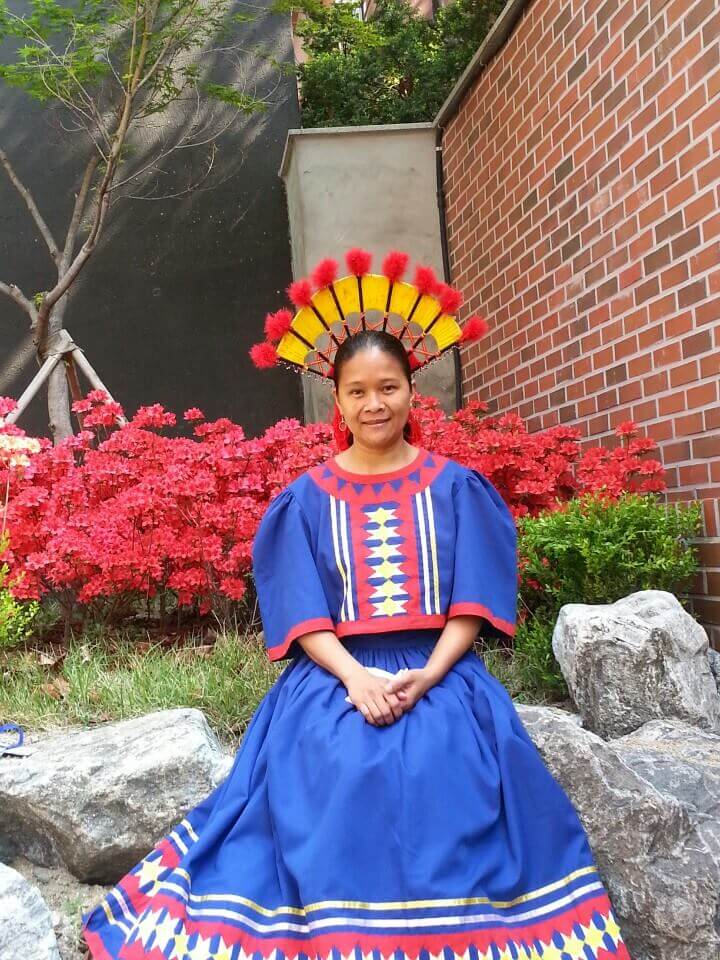
Luda in Talaandig dress
The author is from Malaybalay City, Bukidnon, and is the second of the ten children of Mrs Lucresia Luminhay Egbalic of the Talaandig Tribe in that province and of Mr David Fabre Egbalic, a Boholano. She has been in Korea as a Columban Lay Missionary since 2014.
A Messenger of His Love
I am not a writer, but I’m writing this reflection for myself and for others, hoping to be enlightened more about the Trinity’s love and God’s desire for each one of us to become a messenger of His love and the Holy Spirit, the Giver of Life.
I’ve always believed it is the love of the Trinity that brought me to this beautiful country, South Korea, and compelled me to persevere on mission. I also believe that this mission is not mine. It is God’s mission, and He has blessed me to carry it out with Him. God is always at the forefront, and I follow Him. There would be times when I kept my distance from Him because I felt tired and even tempted to stop. But along the way I knew God had sent the Holy Spirit to keep me going.
For my ministry, I was assigned to the parish of the Nativity of the Blessed Virgin Mary (성 모 성탄 ), Neungguk, Diocese of Uijeungbu, created from the Archdiocese of Seoul in 2004. I would say about 75% of the church-goers are the youth and older parishioners. Most often the youth and young professionals or couples are seen whenever they sponsor Masses. But what is really inspiring is having many of the elderly who, despite complaining about the pain in their backs or knees – are joyfully carrying out their ministries in the church. They are more involved in church activities, because we cannot ask for more time from the youth due to their studies, nor the young adults due to their work. Because of the high cost of living, the younger parishioners need to work hard to earn enough to be able to afford their daily needs and maintain their lifestyles which are influenced by fast-changing trends and fashions.

Flowering shrubs, Korea
What is it like to be a Columban Lay Missionary in situations like these?
I visit the sick and the elderly in their homes. Most of them live alone, but there are those who are alone only during daytime because their family members are at work or in school.
Grandma Ana is one of the women I visit. She is 75 and suffering from pulmonary fibrosis, which makes it hard for her to breathe without an oxygen tank. Her son, who is in his 50s and is mentally disturbed, and her granddaughter, who is studying in middle school, both live with her. Grandma Ana doesn’t have other relatives and had no one to help do errands for her. This is why whenever I visit her, she would always express her gratitude. In return, I would always answer, ‘We are one in God’s family, Grandma’. A few times I went to the hospital to see her doctor to explain her condition, using my limited Korean. On each occasion the doctor gave me the prescribed medicines for her. It is a challenging ministry for me, but I believe God works with me all the time.
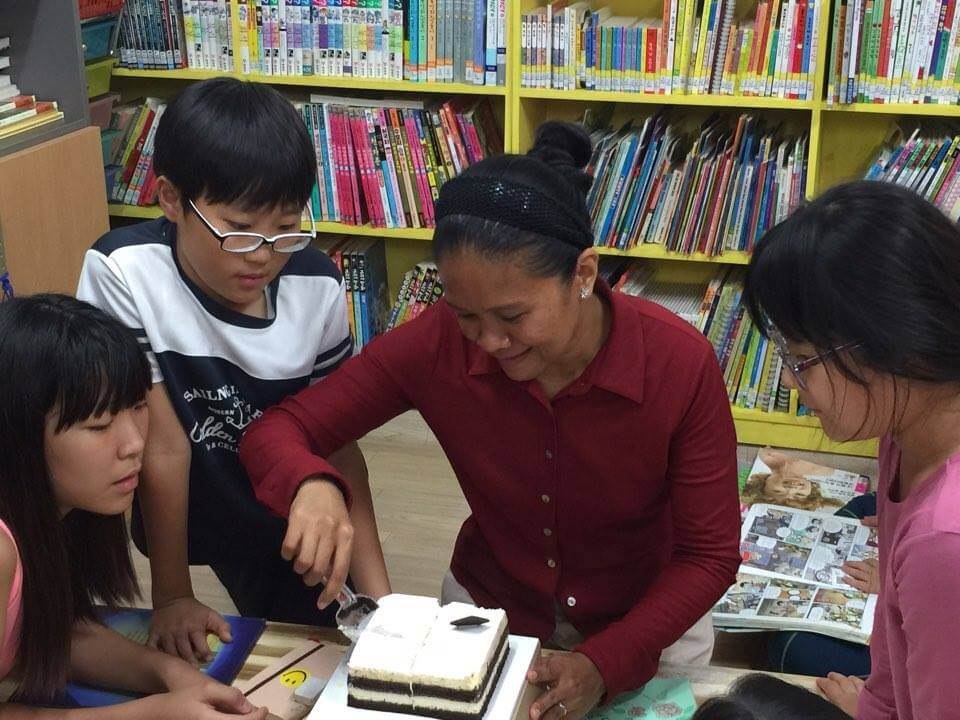
Luda celebrating her birthday with Korean friends
Another patient I visit is Theresa who is undergoing hemodialysis. She is 58 years old and has two sons. The eldest son lives with her. Her son leaves the house very early and arrives home late at night from work. Theresa’s right arm is paralyzed, and she has difficulty standing up as well as walking. She cannot prepare meals by herself. She is dependent on her son who prepares her meals for her. During my visits, I noticed Theresa would eat either bread with milk, noodles, or even nothing for lunch. Oftentimes, I’d bring some food for her. But I sense she is more grateful for my presence than the food I bring. When I’m with her, we would share about our experiences with smiles and tears, watch our favorite television programs and pray together. I help her with a few house errands as well.
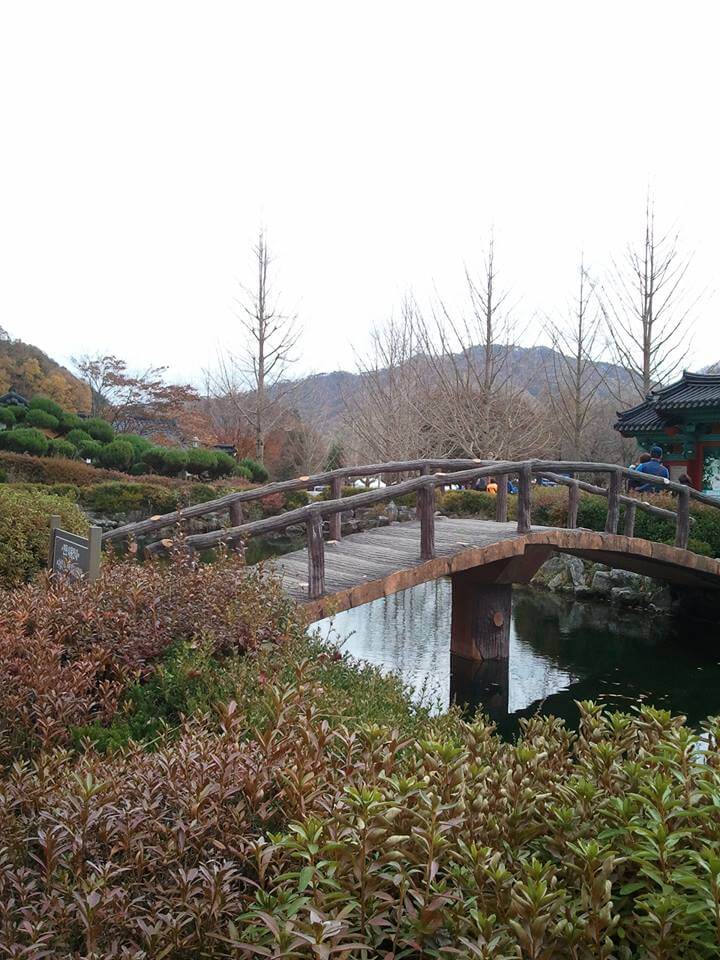
Footbridge
There is another grandmother I visit who is in her 80s. She lives alone. Her house doesn’t have its own toilet. With her physical condition, I sense her discomforts especially during autumn and winter. She is hard of hearing and communicating by phone is impossible. Whenever I ask her about her family, she replies, ‘They’ve all died’. During my early visits she refused to answer or listen to my queries. Eventually, I gained her trust enough for her to open up about her family. She still has a daughter who lives in the USA, but she has not visited South Korea since she left. I could sense the pain in the facial expression of the grandmother. I was happy when she told me to come again. Since then, I’ve been visiting her regularly.
What is the Holy Trinity’s message for me?
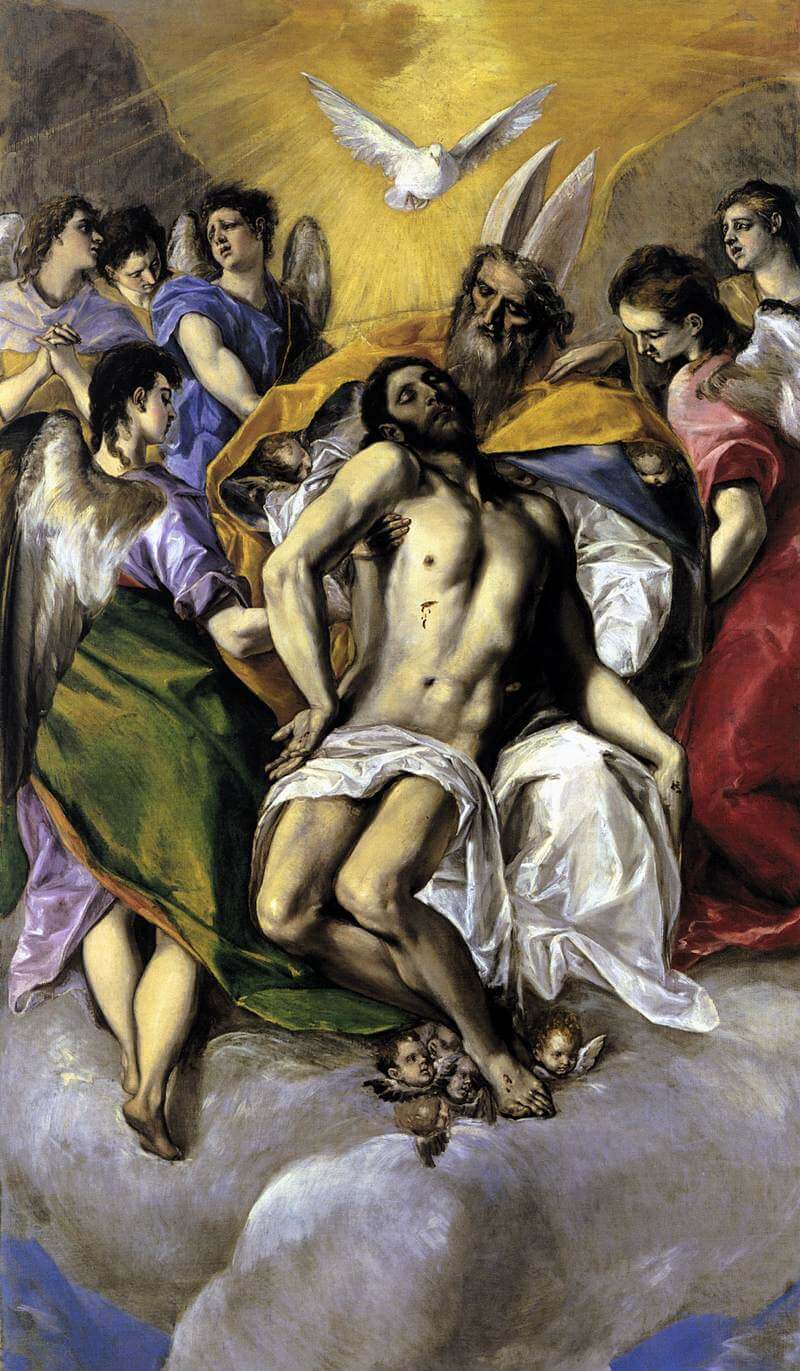
The Trinity, El Greco [Web Gallery of Art]
God, the Father created the world with human beings as the stewards of His creation. God sent His only Begotten Son, born of the Virgin Mary. Jesus suffered, died and rose from the dead for all humankind. The Divine Persons of the Holy Trinity are bound together in love. As a lay missionary assigned to South Korea I believe that I must bind myself in God’s love and be the messenger of the Giver of life to others, Christians and non-Christians, most especially to the elderly and the sick.
Jesus Christ has taught me that to be a lay missionary means to love. When I love I have to die to myself. It is not an easy way of life. With my little faith and love, I commit myself to following God and to be with others especially those who are suffering from emotional poverty.
There are times when I wanted to go back to the Philippines, particularly when I got sick and missed my family, my friends and familiar comforts back home. My faith wavered during these low moments. I experienced God’s love which has brought tears of genuine happiness and striking pains as well, which is beyond my human understanding.

Korean sunset
In my prayer, I heard Him whispering to me His words through the Gospel of St John, ‘If you understand these things, you will be blessed if you do them’ (John 13:17). In facing different circumstances in my life, I cannot fully understand God’s will, yet His love is amazingly powerful and inspiring that it has moved me to continue on this mission whether in happiness or in sadness.
This is why I always begin and end my prayers of thanksgiving ‘In the Name of the Father, and of the Son, and of the Holy Spirit. Amen.’
Photos courtesy of Luda L. Egbalic
Firmly I believe and truly
This hymn to the Trinity was written by Blessed John Henry Newman in 1865.
1 Firmly I believe and truly
God is Three and God is One;
and I next acknowledge duly
manhood taken by the Son.
2 And I trust and hope most fully
in that manhood crucified;
and each thought and deed unruly
do to death, as he has died.
3 Simply to his grace and wholly
light and life and strength belong,
and I love supremely, solely,
him the holy, him the strong.
4 And I hold in veneration,
for the love of him alone,
Holy Church as his creation,
and her teachings as his own.
5 Adoration may be given,
with and through the angelic host,
to the God of earth and heaven,
Father, Son, and Holy Ghost.
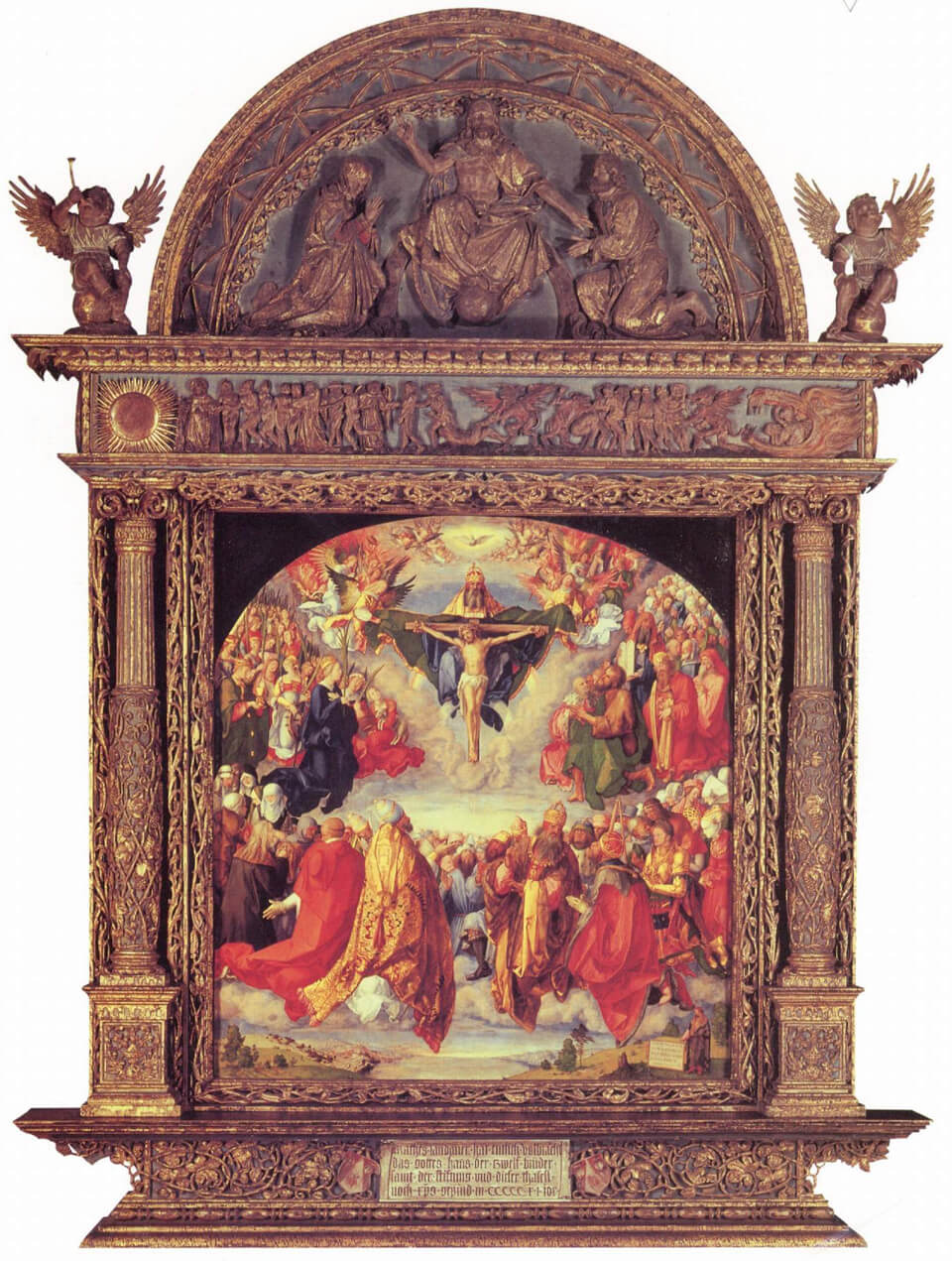
The Adoration of the Holy Trinity (Landauer Altar), Albrecht Dürer [Wikipedia]
Through the Eyes of the Child
By Deacon Erl Dylan J. Tabaco
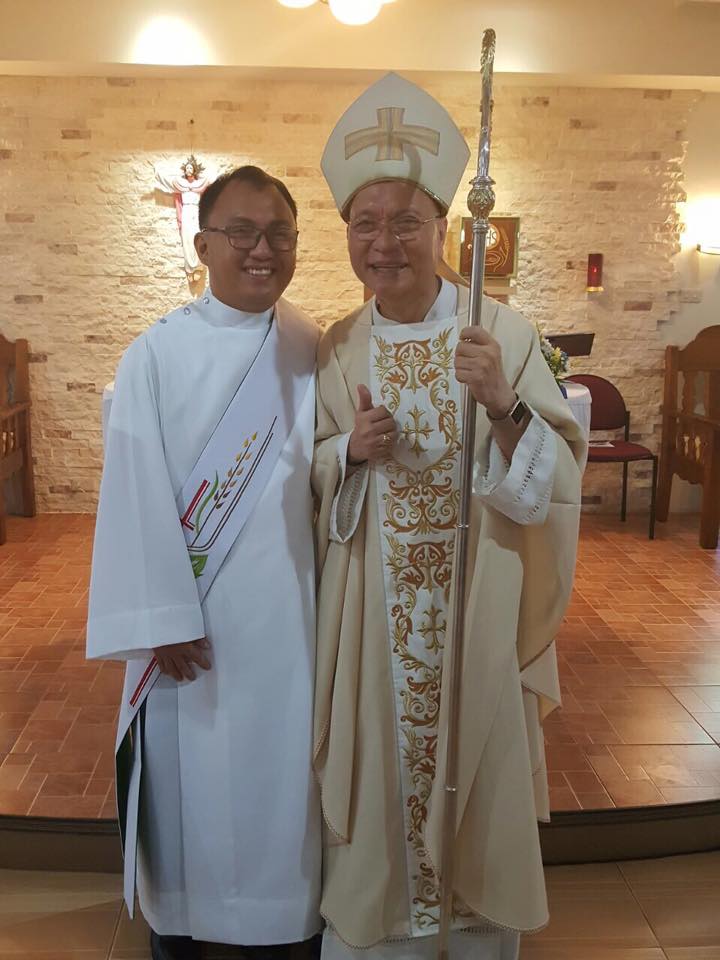
Newly ordained Deacon Erl Dylan J. Tabaco with Bishop Honesto F. Ongtioco of Cubao
The author became a permanent member of the Missionary Society of St Columban on 29 April and was ordained deacon by Bishop Honesto F. Ongtioco of Cubao the following day in the chapel of the Columban House of Studies, Cubao, Quezon City. He spent two years, 2014 – 2016, in Peru on his First Mission Assignment (FMA), part of his preparation to be a Columban missionary priest. He is from Holy Rosary Parish, Agusan, Cagayan de Oro City. He is a regular contributor to MISYONonline.com. Here he tells us of his experience in Manuel Duato School for Special Education from March to December 2015.
One of my most memorable experiences in Peru was my ministry in Manuel Duato School for Special Education, which serves young persons with special needs. It was founded on 16 July 1976 by Fr Austin Garvey, an Associate Priest of the Columbans from the Archdiocese of Westminster, England, and Columban Sister Elizabeth Doyle.
The school is located in Los Olivos, Lima, and has 500 students, mostly from poor families. Columban Fr Edward O’Connell, from England, supervises the ministries in the school. With the help of local government it provides integral formation for students with different needs such as learning disabilities and profound deafness. Parents are also involved.
39th Anniversary of Manuel Duato School, 2015
After months of studying Spanish and observing different Columban ministries I chose to get involved in Manuel Duato, in addition to my work in Our Lady of the Mission Parish where I was assigned and where Fr Edward O’Connell is parish priest, and started there in March 2015. I worked on Tuesdays, Wednesdays and Thursday with profoundly deaf children, something I was familiar with since I had been involved in ministry with the Deaf for nearly seven years in my home Parish of Our Lady of the Holy Rosary, Agusan, Cagayan de Oro City, before entering the seminary. So being with profoundly deaf children in Lima would be like encountering persons very dear to me, I thought. And I was excited at being able to use again the Sign Language I had learned in the Philippines.
However, I realized as I introduced myself to the children on my first day in Manuel Duato that they didn’t understand my Sign Language. I lost my nerve and didn’t know what to do. I had thought that there was a universal Sign Language. But their teacher, Ms Guadalupe ‘Lupe’ Jara, who is profoundly deaf, could lip-read and knew what I was saying. She helped me compose myself.
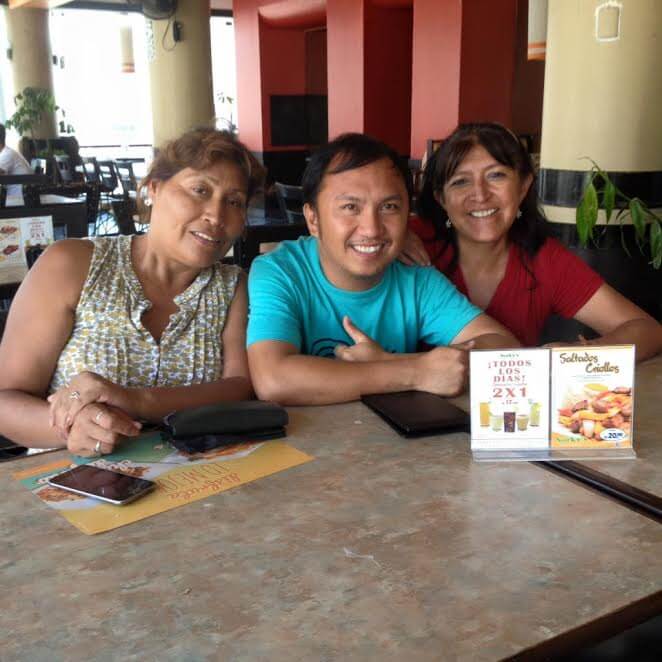
L to R: Ma’am Yolanda, hearing co-teacher, Erl, Ma’am Lupe, deaf teacher
Learning Spanish and Sign Language at the same time drove me crazy. I had to construct my sentences in Spanish first before translating them into Peruvian Sign language. At times I got upset with myself and began to push myself too much. But I learned that there is no shortcut in anything. The reassuring presence of Ma’am Guadalupe gave me the energy to learn a new Sign Language. She told me that in learning the language of the deaf, one has to experience deafness for oneself. We can only appreciate the world of the Deaf if we allow ourselves to be ‘deaf’ in the sense of being in communion with them. Her years of experience had taught her to be in solidarity with her students and her advice inspired me. She even told me to allow the children to teach me and that I would be surprised at how well they could teach.
I enjoyed learning new things from the children. If things started to become mundane, I would recall what Ma’am Lupe said about ministry – that it is not about accomplishing things but rather learning the value of everything that you do. I entered into the world of the Deaf, which made me appreciate the values that they were imparting to me. Their joy was contagious. I realized that teaching is not only about reading, arithmetic, arts, and writing but also about inculcating the values behind the things that you do.
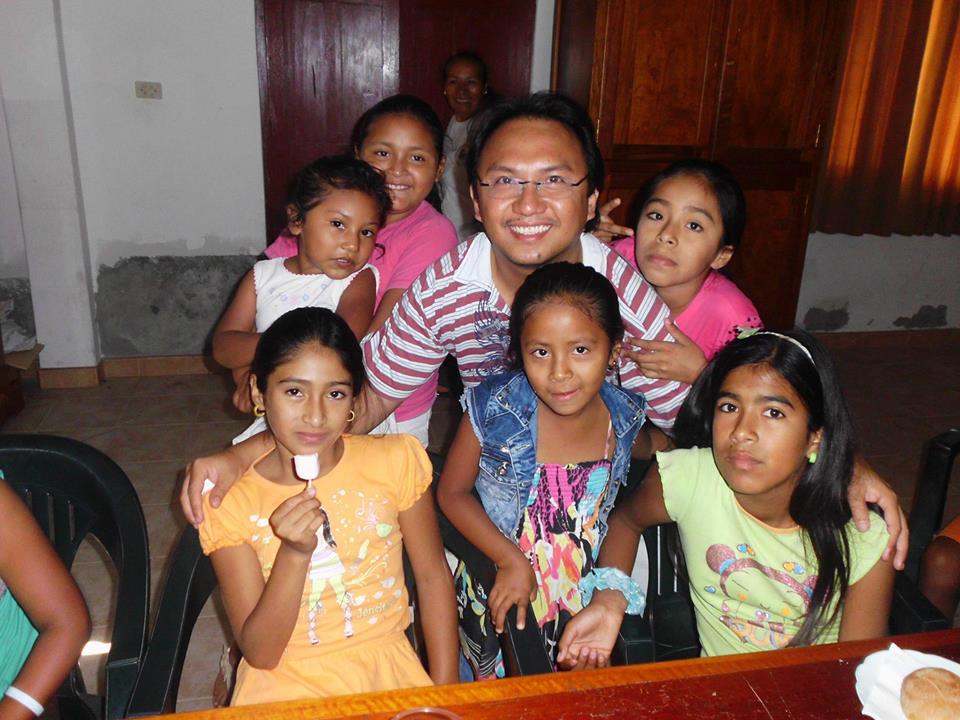
Erl with youngsters in Peru
Time flew very fast and I enjoyed every moment with the Deaf, who have a very special place in my heart. Through the Deaf in my home parish I found my vocation. I learned from the Deaf in the Philippines and in Peru how to stick with the non-negotiables in life such as love, joy and solidarity. My whole experience with them reflects these three essentials elements of Christian life.
I spent Mondays at Manuel Duato School with another group, those who had Down Syndrome, cerebral palsy and multiple disabilities. These were adults, most of them older and bigger than me. They called themselves Club de Amigos. My ministry with them was basically companionship since their teachers were psychologists and occupational therapists. At Manuel Duarto School they learned basic social skills and how to do routine tasks such as eating by themselves, washing their own utensils and taking care of school property.
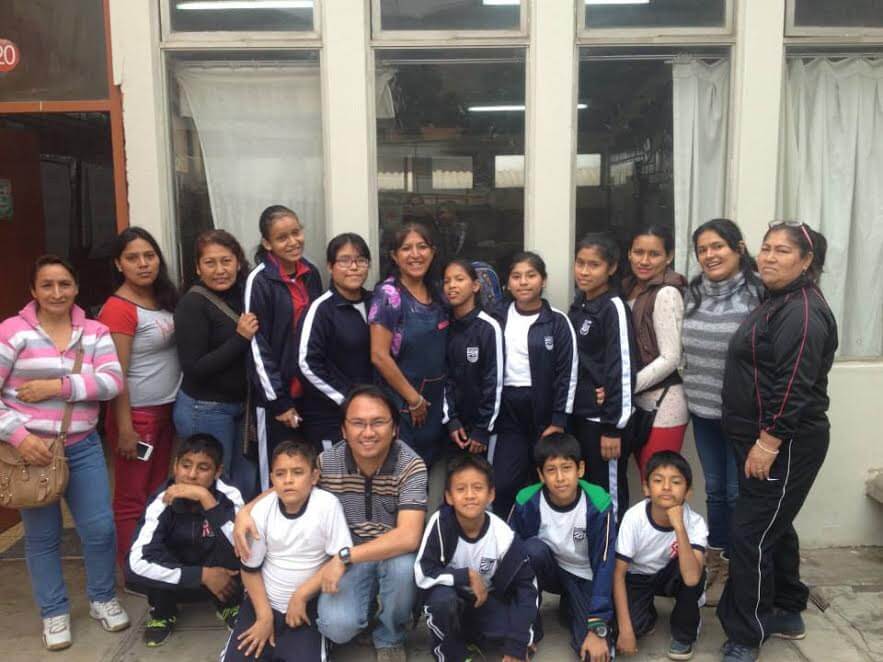
Erl with deaf students
On occasion some of the Amigos would have a meltdown and it took much effort and experience to calm them down. I was not really prepared to handle this but learned from others how to deal with certain situations. Of all the ministries I have been involved with as a seminarian this was the most challenging and yet very fulfilling. Every time I accompanied the Amigos in manual exercises I felt like one of them. I have my own weaknesses and need the help of others. I saw in their vulnerability my responsibility to help make this world worth living in. I also realized how privileged I was. When I saw them smiling and laughing the joy within me was overflowing. I learned to laugh even when I didn’t see the humor in their jokes.
As with the deaf children, the joy of the Amigos was contagious and every day was a celebration of life. They allowed me to leave my comfort zone. When problems overwhelm me I tend to forget to appreciate the present moment. Looking at them gave me the impression that they had no idea of what their past was or future would be. They lived in the present moment by being grateful for everything they had. They reminded me to be grateful for what the present moment has to offer and taught me many valuable lessons about life that I will always carry with me.
After one year in Peru I was no longer the same person who had left the Philippines. The two different ministries at Manuel Duato School prepared me to be a person with and for others. My experience there helped me appreciate the ‘inner child’ through which we learn the basics in life such as love, joy and solidarity. It was the innocence of the child that really captured my attention. Jesus said, ‘Unless you turn and become like children, you will not enter the kingdom of heaven’ (Matthew 18:3).
I believe that my ministry with these two special groups in Manuel Duato School prepared me for something great in the future. I wish I could have spent more time with them but my mission in Peru had to end. By retelling this story ‘My soul proclaims the greatness of the Lord’ (Luke 1:46) for it is God who sent me to Peru not only to do my mission but also to learn its value. Being missionary is more than being about accomplishing many things. It is a vocation. When you love what you are doing because the people whom you are ministering with have instilled in you the value of your ministry your work becomes a vocation. Therefore I would say that ‘through the eyes of the child’ I found where my vocation is, which is to love and serve the Lord in everything.
Feels Like Home – Manuel Duato Project
St Christopher’s Primary School in Airport West, Melbourne, Australia, has a connection with Manuel Duato School and this video is one result of that. You may read about that connection here.
Living My Dream
By Febie M. Gonzales
Febie is from Alamada, Cotabato, and graduated with a BS in Accounting and Financial Management from Notre Dame University, Cotabato City. She is currently studying Mandarin Chinese full-time in Hsinchu City, Taiwan, and discerning a placement for ministry to start in July.
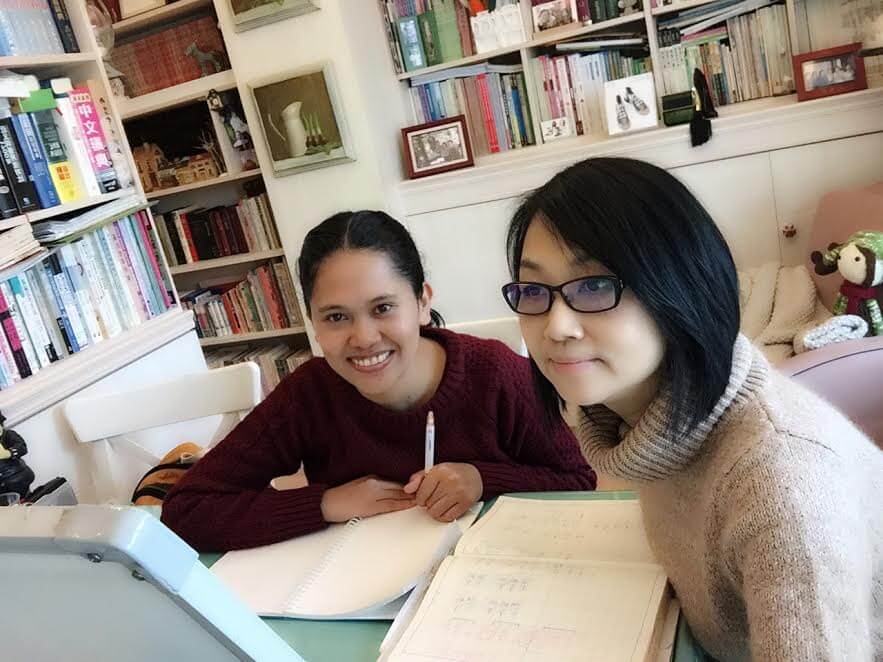
Febie with Judy Chu, her Mandarin teacher<
It all started with a dream. I came to Taiwan in June 2016 for my three-year term as a Columban Lay Missionary. This was my first experience of cross-cultural living. I was so excited. At the beginning life was great. Then I began to study Mandarin Chinese. My class was on a one-to-one basis two hours daily. My program of study was divided into four parts: listening, speaking, character reading and writing. As I write, I am in the listening and speaking parts.
Mandarin has four tones. It challenges me and was eager to learn. At our first meeting my lăoshī (‘teacher’ - 老师 in Chinese script) said: ‘I want you to be relaxed and calm. If you want to learn the language, do not be afraid just let go, have self-confidence and trust in God’. I kept pondering on that statement and, over time, discovered that it was not easy to learn this language.
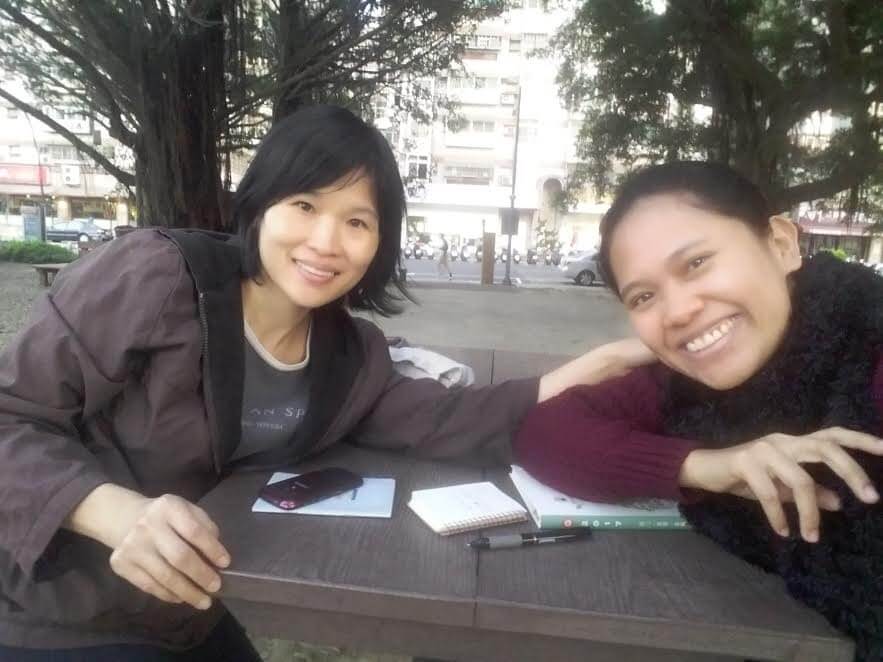
Febie with her friend Rainbow, a cook in a center for children
My experience was tough and I shed many tears of frustration and felt very vulnerable too. To listen is easy but to imitate is very hard, especially in connecting the tones. I felt I was tone-deaf. When one tone is wrong the whole sentence is totally wrong. I felt so pressured and nervous that I could not relax. Every day my assignment was to listen and imitate, practice, record my voice and listen again, identify my mistakes and correct them. Correcting myself many times gave me the confidence that I was getting the tones right only to find out my lăoshī would always say, ‘Repeat. Be natural and have Chinese feelings, relax and have self-confidence. You can do it’.
Almost every day was the same. However, I did not give up, I kept on trying to listen and to imitate like a little child. In time I learned to trust myself. When I did so a ‘mysterious change’ came and I gradually overcame the most difficult part of my language study.
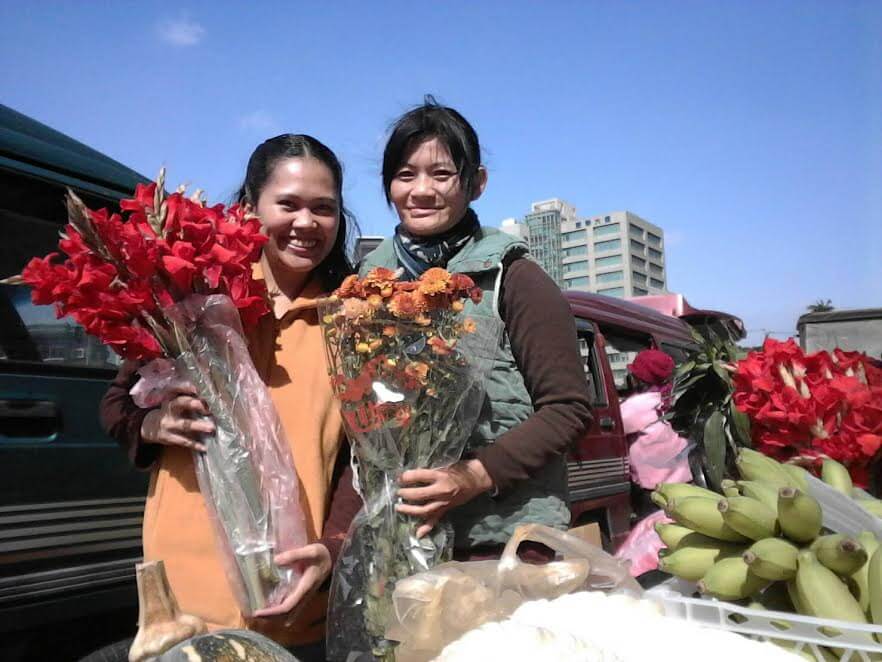
With Tracy, a fruit and vegetable vendor, now a friend
Taiwanese people are so polite and friendly. I reached out and made some new friends. These janitors, fruit vendors, vegetable vendors, waiters, and the community at Mass that included Filipino caregivers. Every day, I found opportunities to say, ‘Ni hao! Ni hao ma?’ (‘Hello! How are you?’) I could talk and understand others with only a little Chinese but this little made me more determined, inspired and courageous enough to learn the language and put my heart into it.

Hsinchu City, Taiwan [Wikipedia]
One day during our retreat I humbly asked God for humility, perseverance and the guidance of the Holy Spirit to submit my whole self to Him and embrace the process of learning like a little child, to listen and imitate with a pure heart, to be simple and not afraid to commit mistakes, willing to be formed and molded in His ways. I trusted and believed in Him that my language journey was part of a process of entering into the deeper me, knowing and accepting the inner core of who I am, the real authentic me in the eyes of my Master. From then on I have happily grown and bloomed.
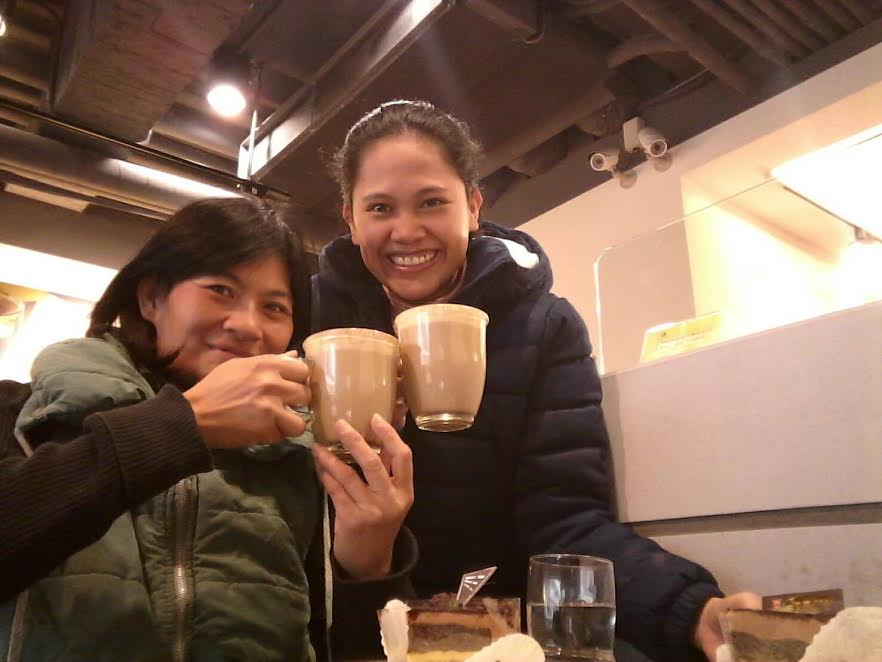
A birthday treat from Tracy on Febie’s birthday
I am living my dream of becoming a missionary, a challenging life that is full of treasures, meaning, joy, peace, love, satisfaction and fulfillment. Moreover, I am happier to accept the challenges that await as I serve God, to witness, to walk with, to live with people, to listen and imitate like a little child. ‘Amen, I say to you, whoever does not accept the kingdom of God like a child will not enter it (Luke 18:17).
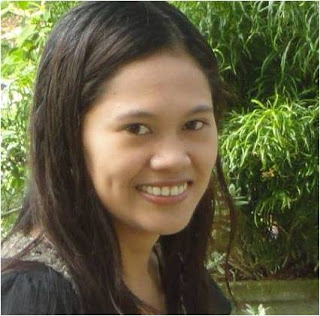
Febie M. Gonzales
An Easter Experience: Parable of the loving father and his two sons revisited
By Fr Barry Cairns
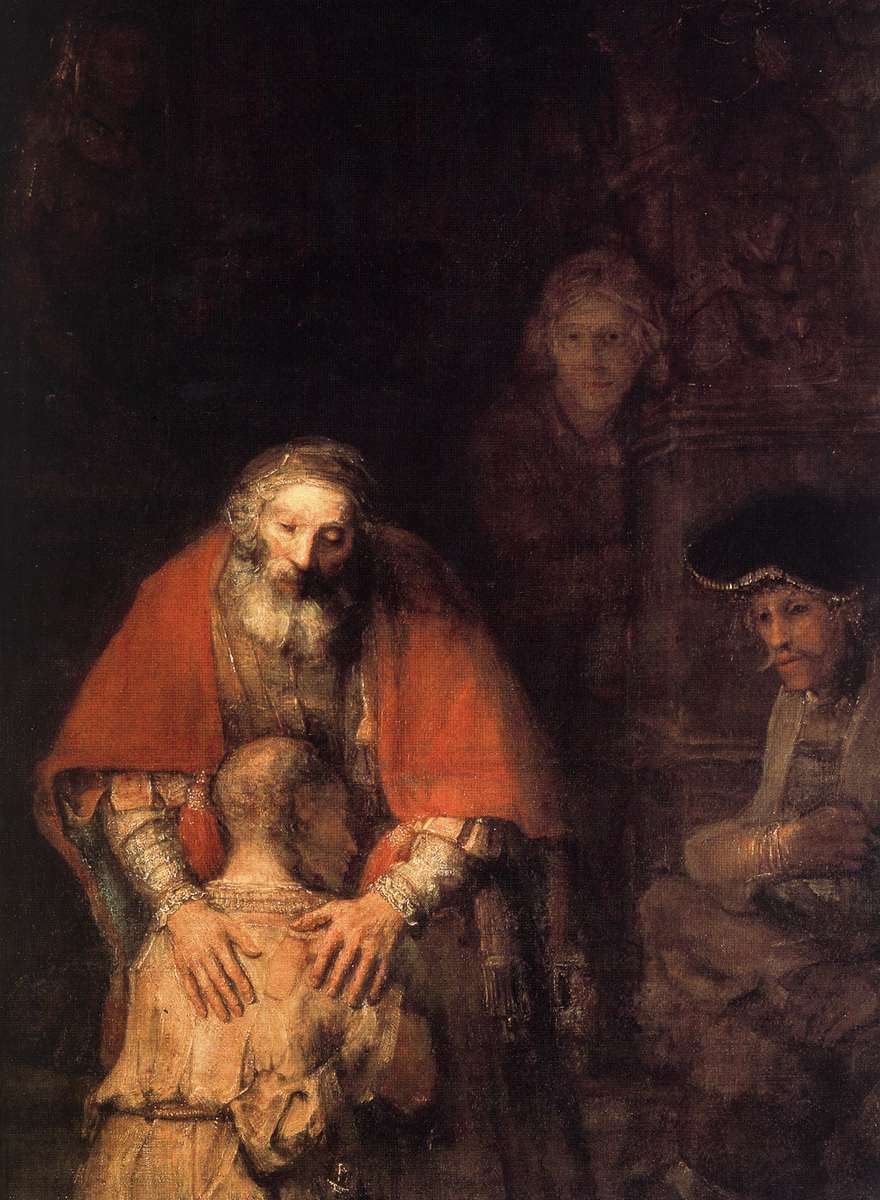
The Return of the Prodigal Son, Rembrandt
Christ is risen, He is risen indeed. The Easter season, which ends this year on 4 June, Pentecost Sunday, reminds us that from death comes life. An encounter with the Risen Christ can bring peace, forgiveness and reconciliation out of situations of animosity, division and the inability to forgive. Columban Fr Barry Cairns from New Zealand shares an Easter story of his parish pastoral council reaching out to forgive. He has been a Columban missionary priest in Japan since 1956.
Fifty years ago I was pastor of an 'old Christian' community in Sakita, Shimoshima, the largest of the Amakusa Islands in the far south of Japan. By 'old Christian' I mean that a Jesuit missionary, Fr Luis Almeida, founded the parish 451 years ago in 1566. Then the Tokugawa daimyo government expelled or executed all missionaries. The Amakusa community went into hiding, remaining faithful for 240 years.
The church in Sakita where Fr Cairns served
This persecution officially ended in 1873 by Imperial decree. However, the attitude of persecuting Christians was deeply embedded. The parish on Amakusa Island was a small village, one third being Christian. Nearly all were very poor fishermen.
When World War II came those slumbering antagonisms against Christians resurfaced. During the war the Catholic community suffered blatant discrimination and mischievous slander even in the school classroom. Christians were regarded as doubtfully loyal towards the Emperor who was regarded as a living god.
One day, 20 years after the end of World War II, a woman (I will call her Mrs Tanaka) came to the rectory door and said to me: ‘My husband is dying. He has cancer. He would like to see you.’ So I went with her to a small house where the sick Mr Tanaka was lying on the tatami mats. We talked together for a long time. It emerged that Mr Tanaka was a baptized Catholic from an 'old Christian' family. However he had not been near the Church for over 40 years.
‘Is it possible for me to return?’ he asked me. I replied: ‘Most certainly! Jesus gives people like you a very special warm welcome back.’ And so he received the Sacrament of Reconciliation. I told him I would be back on Sunday afternoon with Anointing of the Sick and Holy Communion. I left that house with a man at peace.
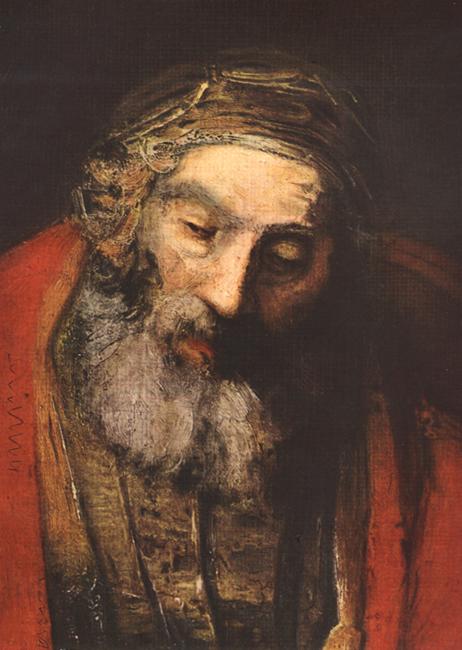
The Return of the Prodigal Son (detail), Rembrandt
On Saturday evening there was a meeting of the parish council. I told them about my recent visit to Mr Tanaka and his return to the Church. Wow! There was a united human volcanic eruption with red hot lava flowing! ‘You cannot take him back. He is an apostate. Only a few years ago during the war he co-operated with the thought-police and persecuted us.’ Old wounds thought healed came to the suppurating surface.
This is where providence stepped in. The Lenten Gospel for the Sunday was the parable of the loving father with two sons (aka the parable of the Prodigal Son). Without mentioning Mr Tanaka by name I did speak about the elder unforgiving son who wanted punishment rather than forgiveness for his younger prodigal brother. God our Father’s mercy and compassion is for everyone. This elder brother was bathed in the father’s love but took it for granted.
His younger brother made a terrible mistake. In suffering he later realized the depth of his father’s love. He returned to him and received a warm, unconditional welcome back. He was hugged.
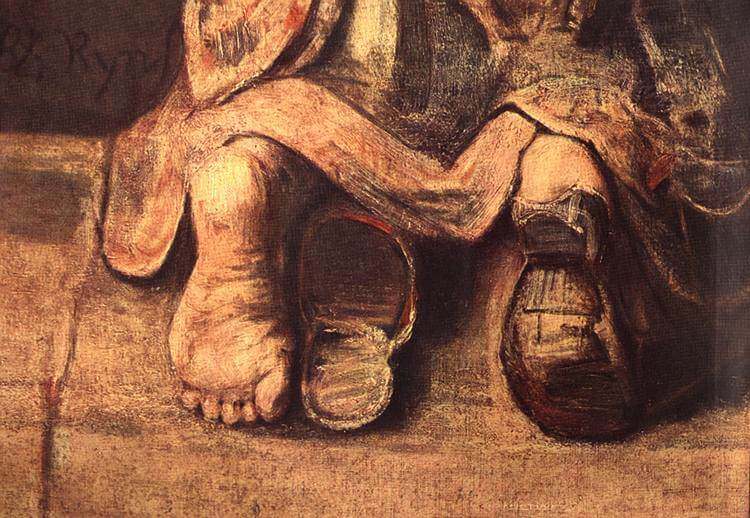
The Return of the Prodigal Son (detail), Rembrandt
At the end of Mass I announced that there would be a house prayer gathering at Mr Tanaka’s home this afternoon at 3:00pm. I left it at that.
It was with anxiety I approached Mr Tanaka’s house that Sunday afternoon. I left my shoes at the door, opened the sliding door and entered a packed room. There in the front row talking to the sick man was my entire parish council.
I choked up with emotion and just said to them: ‘I am proud of you.’
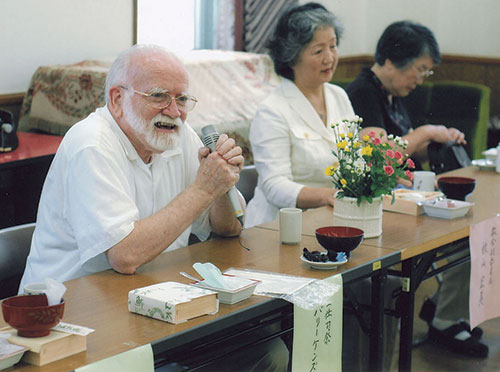
Fr Barry Cairns at a meeting
Rembrandt’s The Return of the Prodigal Son is taken from Web Gallery of Art.
Our Hideaway
Life’s ingrained beauty
By Christian John V. Camorahan

The author
Christian John V. Camorahan is a student at Liceo-de la Salle Senior High School, Bacolod City. The photos are his.
Life is beautiful because everything that we see and experience has some form of innate beauty crafted in the tender hands of God himself. Life is full of moments of bliss, success, comfort, pleasure, and jubilation, moments also accentuated by grief, sorrow, failure, and adversity.

Sunset
Sometimes the beauty of life is like the sun shining brightly but covered by dark clouds which symbolize the melancholy and complications that we have in ourselves. Some people fail to see what is behind those dark clouds because they can either be consumed by negativity, or just fail to notice it. To experience the beauty of life, we must open our eyes and notice everything when we look at our surroundings and not be shallow and blind to them. The meaning of beauty varies from one person to another because it is very subjective.

But the sad truth that underlies our perception of life is that sometimes we treat it more as an adversary than a friend, more of a curse than a blessing because we are too blind to see its real beauty, too ignorant to sense its real meaning, and too shrouded by negativity to experience its wonderful reality.

Wheatfield with Reaper at Sunrise, Van Gogh [Web Gallery of Art]
Sometimes the simplest things are the most beautiful of all but may be overlooked and unrecognized. We tend to ignore the most common things that we have and fail to be grateful since we do not recognize and give value to them. Every day that we wake up and can see our surroundings and make sense of our entire reality is a blessing. We can see all sorts of things ranging from our belongings, our house, the trees outside our window, the colors of the sky as the sun rises over the horizon, the smoky white clouds taking different shapes and forms, the flowers that bloom in the meadow, the grass that sways as the gentle breeze passes along, the sweet faces of our family, and much more. All of these things are simple yet beautiful in their own way.
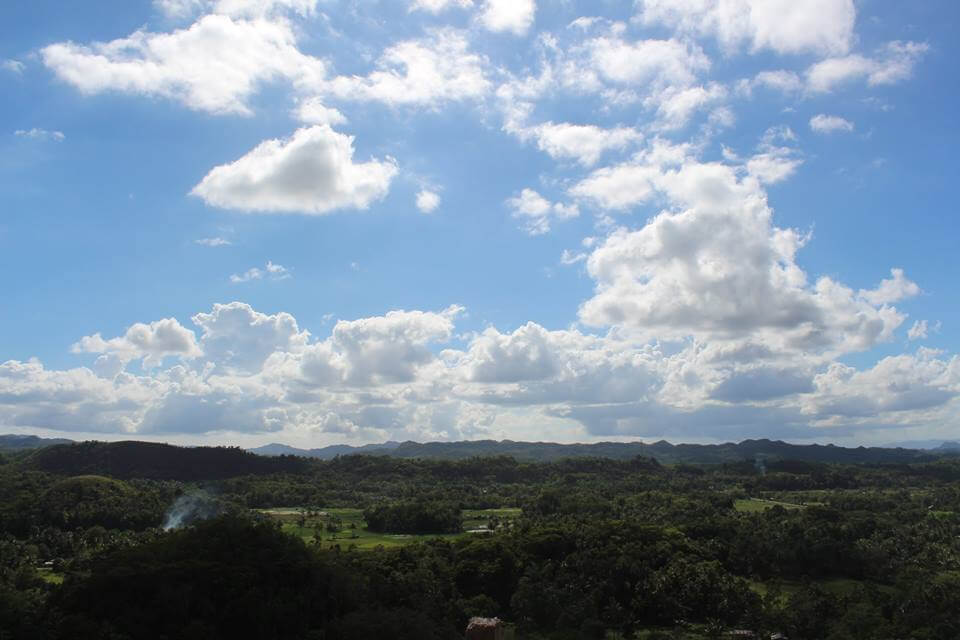
Clouds over Bohol
The saying ‘beauty is in the eye of the beholder’ means that each of us has a different perception of beauty. I may perceive something as beautiful whereas others may not find it attractive at all. Each of us can choose to be blind or not to the beauty in our daily life.
There is no doubt that life is full of blissful moments and wonderful experiences; but adversities and challenges are also a part of life. There are times where we are hurt and experience pain. There are also times that we are so badly wounded that we think that we should just give up walking on our paths through life. We should always remember that no matter what life will throw at us, be it pain and misery, we should never give up and not forget those things that will help us to grow and develop as better individuals. Problems will not last, and life teaches us to endure them and to stay still because at the end of each struggle and hardship we will reap the good fruit of our labor and we will reap what we sow. Life is beautiful because no matter how harsh it is, it never fails to give us happiness and hope.

Still-life with Coffee Pot, Earthenware and Fruit, Van Gogh [Web Gallery of Art]
Some people fail to grasp the beauty of life because they are just focusing on negative things and they do not realize that life is so much more than that. Yes it is true that difficulties are part of living but we should not let our lives revolve around them. Rather, we should be more optimistic and look at problems from a different angle. If we learn that mistakes and adversity do not determine the totality of our lives but can help us to grow, then we can say that they too are beautiful. We should not let negativity hinder us from seeing the beauty around us and we should not give in to it because life is beautiful the way it is.

Flowering Garden, Van Gogh [Web Gallery of Art]
Life is God’s masterpiece. It is an art form crafted with perfection and beauty, an exquisite flower that blooms and grows amidst every adversity.
We should consider that each of us has our own perception of life and bear in mind that God is the artist and He believes that it is beautiful, the way it is, and the way He created it.
God saw everything that he had made, and indeed, it was very good (Genesis 1:31).
God’s Grandeur
By Gerard Manley Hopkins SJ
The world is charged with the grandeur of God.
It will flame out, like shining from shook foil;
It gathers to a greatness, like the ooze of oil
Crushed. Why do men then now not reck his rod?
Generations have trod, have trod, have trod;
And all is seared with trade; bleared, smeared with toil;
And wears man's smudge and shares man's smell: the soil
Is bare now, nor can foot feel, being shod.
And for all this, nature is never spent;
There lives the dearest freshness deep down things;
And though the last lights off the black West went
Oh, morning, at the brown brink eastward, springs —
Because the Holy Ghost over the bent
World broods with warm breast and with ah! bright wings.
To Search is To Find

Confession during a youth pilgrimage, Chile
My aunt in her last moments was asking for the Sacrament of Reconciliation. Since it was Holy Week we weren’t able to get a priest. She died on Holy Thursday and I felt so sorry for her not receiving Holy Communion. Father, will her soul be at peace with the Lord? Were her sins forgiven?
Part of the background to this, I have learned, is that your aunt had just retired and had moved from the island where she had been living for many years to a town on another island and became gravely ill within a number of days. She was taken first to a local hospital for immediate treatment but then taken to a larger city hospital that doesn’t have a Catholic chaplain. And if the Chrism Mass in the cathedral of a diocese takes place on Holy Thursday morning, as I know it did in this case, it makes it difficult for a priest to be available for the sick, since he has to celebrate the Mass of the Lord’s Supper that afternoon in his parish, possibly in two locations.
Normally, if the sick person is fully conscious, the priest administers three sacraments: Confession (Sacrament of Reconciliation), the Anointing of the Sick and Holy Communion. If the person is dying the latter is called ‘Viaticum’, which means ‘food for the (final) journey’.
Your aunt clearly had a desire to confess her sins before dying. That means that she was repentant. And the family tried to get a priest. I believe that it is impossible for God not to respond to a person’s desire for reconciliation, since the very desire is a grace from God. And though Jesus gave the Seven Sacraments to the Church as a gift for all of us, and the Sacrament of Reconciliation as the normal way in which we ask for and receive his forgiveness, God is not limited by human circumstances that make the normal impossible. Your aunt desired to die fully reconciled with God. And only God can read what is in the depths of our heart and only God can fully respond to that.
The Catechism of the Catholic Church, 1451-1453, speaks of contrition: Among the penitent's acts contrition occupies first place. Contrition is "sorrow of the soul and detestation for the sin committed, together with the resolution not to sin again." You will find more here.
No 1457 reminds us: According to the Church's command, "after having attained the age of discretion, each of the faithful is bound by an obligation faithfully to confess serious sins at least once a year."
We need to confess our sins frequently, even if we haven’t committed any mortal sins, which cut off our relationship with God. If we willfully persist in that state we are cutting ourselves off from God’s love for all eternity.
In his encyclical letter Spe Salvi Pope Benedict XVI writes beautifully about our relationship, in God, with our loved ones who have gone ahead. In No 46 he says, Paul begins by saying that Christian life is built upon a common foundation: Jesus Christ. This foundation endures. If we have stood firm on this foundation and built our life upon it, we know that it cannot be taken away from us even in death.
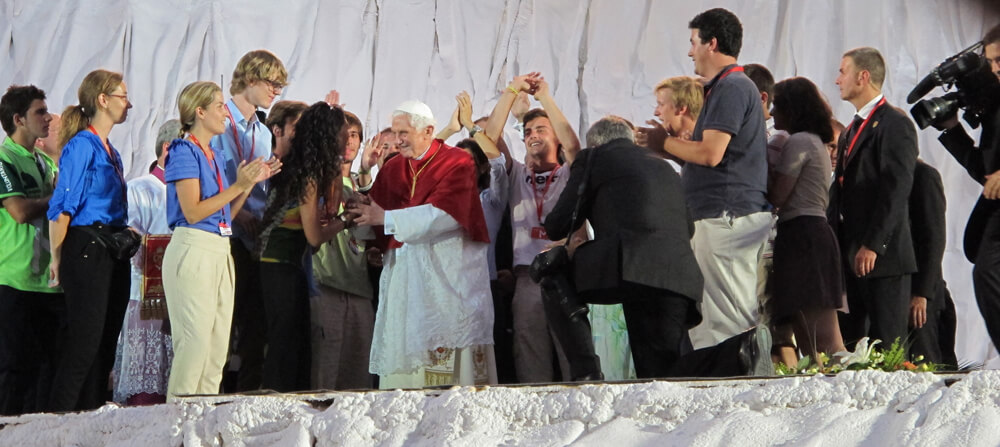
Pope Benedict at World Youth Day, Madrid, 2011 [Wikipedia]
In No 48 Benedict speaks about the interconnectedness of the living and the dead and how our prayers help those who have gone ahead of us if they go through the purification of purgatory. The belief that love can reach into the afterlife, that reciprocal giving and receiving is possible, in which our affection for one another continues beyond the limits of death—this has been a fundamental conviction of Christianity throughout the ages and it remains a source of comfort today. Who would not feel the need to convey to their departed loved ones a sign of kindness, a gesture of gratitude or even a request for pardon? Now a further question arises: if “Purgatory” is simply purification through fire in the encounter with the Lord, Judge and Savior, how can a third person intervene, even if he or she is particularly close to the other? When we ask such a question, we should recall that no man is an island, entire of itself. Our lives are involved with one another, through innumerable interactions they are linked together. No one lives alone. No one sins alone. No one is saved alone. The lives of others continually spill over into mine: in what I think, say, do and achieve. And conversely, my life spills over into that of others: for better and for worse. So my prayer for another is not something extraneous to that person, something external, not even after death. In the interconnectedness of Being, my gratitude to the other—my prayer for him—can play a small part in his purification.
Here in the Philippines we have strong tradition of praying for the dead, both immediately after the death (or in some places after the burial) with the traditional novena led by a lay person, at the time of All Saints and All Souls and on anniversaries, in particular. That is very much in line with what Pope Benedict is saying. The Funeral Mass (not ‘Mass of the Resurrection’ as it is often wrongly called) is offered for the repose of the soul of the deceased. The Funeral Mass should never be treated as ‘A Celebration of the Life of N’, as it so often is now. That is to deny the deceased the charity of our prayers.
The Communion Antiphon in the Funeral Mass During Easter Time reflects Spe Salvi in No 46:
I am the Resurrection and the Life, says the Lord.
Whoever believes in me, even though he dies, will live,
And everyone who lives and believes in me
Will not die for ever, alleluia. (John 11:25-26).
Pray for the eternal rest of the soul of your aunt, who sought God’s forgiveness before her death, in the hope that the words of Jesus himself offer.
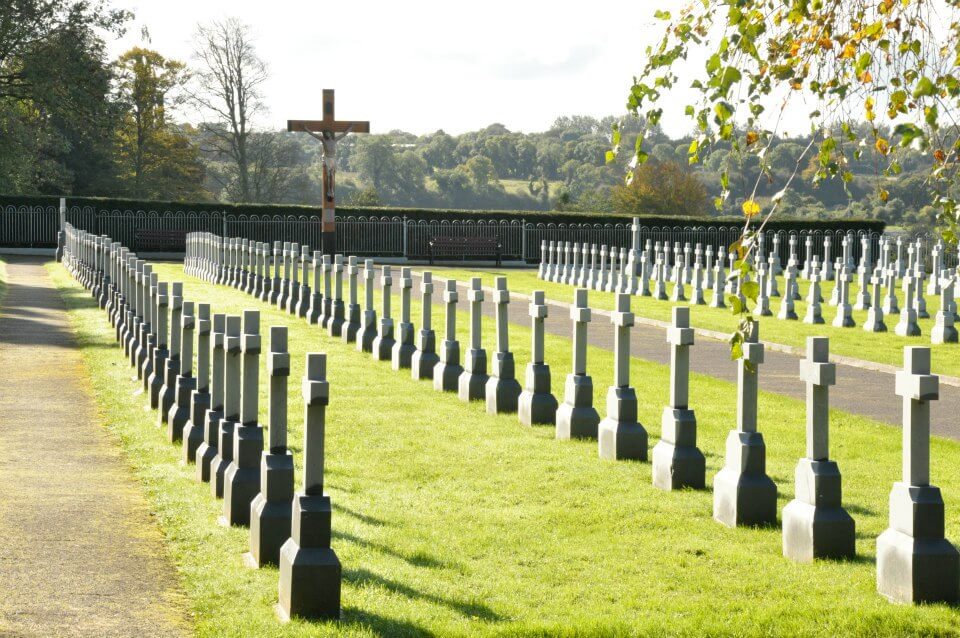
St Columban’s Cemetery, Ireland
Collect from Funeral Mass during Easter Time
Listen kindly to our prayers, O Lord:
as our faith in your Son,
raised from the dead, is deepened,
may our hope of resurrection for your departed servant N.
also find new strength.
Through our Lord Jesus Christ, your Son,
who lives and reigns with you in the unity of the Holy Spirit,
one God, for ever and ever.
+++
Pope Benedict quotes the opening lines of a poem by John Donne (1572 – 1631): No man is an island, entire of itself. The poet, among other things, reminds us in the last lines that each death is a reminder to us of our own and that we should always be prepared for it: And therefore never send to know for whom the bell tolls; it tolls for thee.
No Man is an Island
No man is an island entire of itself; every man
is a piece of the continent, a part of the main;
if a clod be washed away by the sea, Europe
is the less, as well as if a promontory were, as
well as any manner of thy friends or of thine
own were; any man's death diminishes me,
because I am involved in mankind.
And therefore never send to know for whom
the bell tolls; it tolls for thee.
Peace By Peace
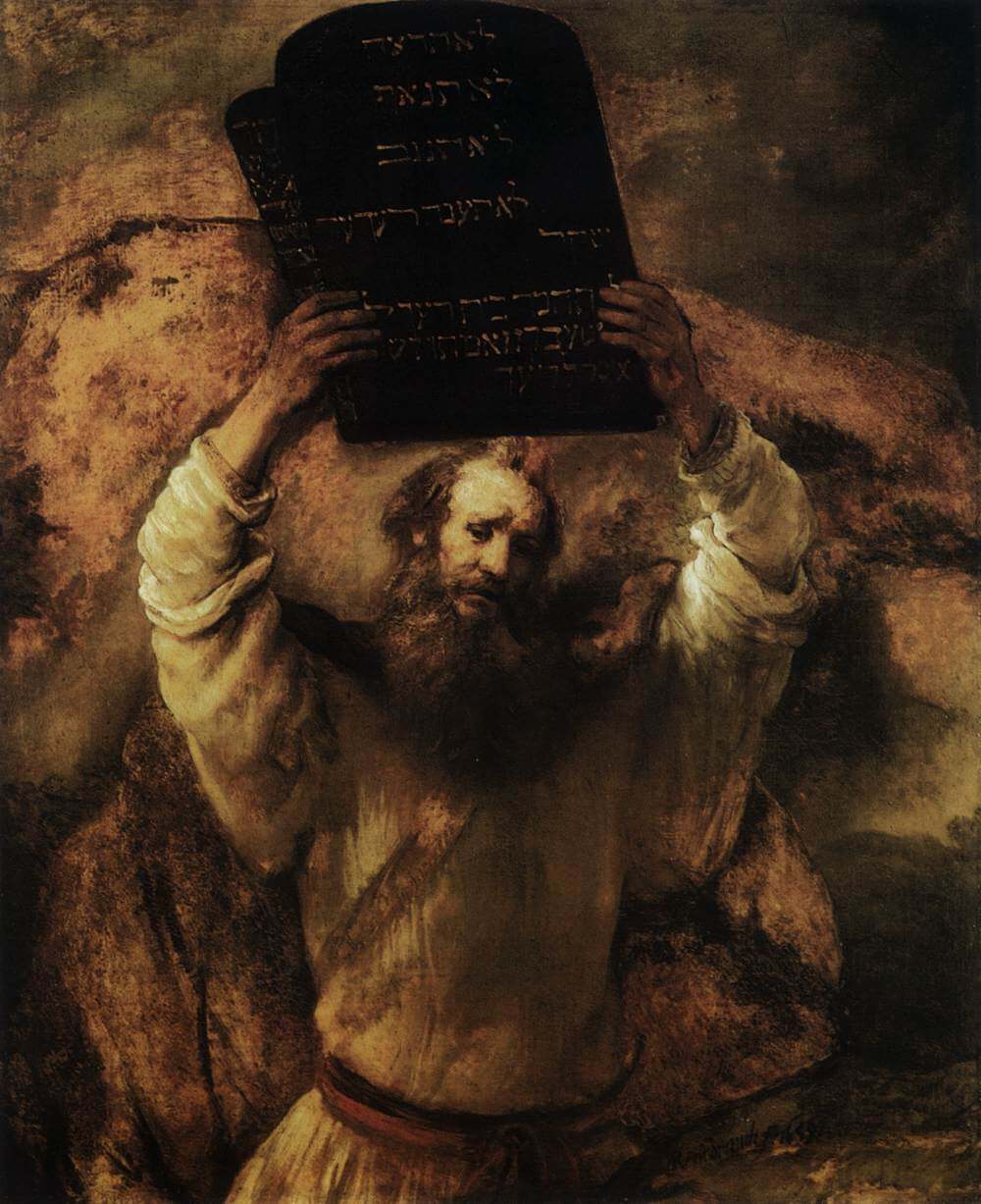
Moses Smashing the Tablets of the Law, Rembrandt [Web Gallery of Art]
You must not distort justice: you shall not show partiality; you shall not take a bribe, for a bribe blinds the eyes even of the wise and twists the words even of the just. Justice, justice alone shall you pursue, so that you may live and possess the land the Lord, your God, is giving you.
~ Deuteronomy 16:19-20

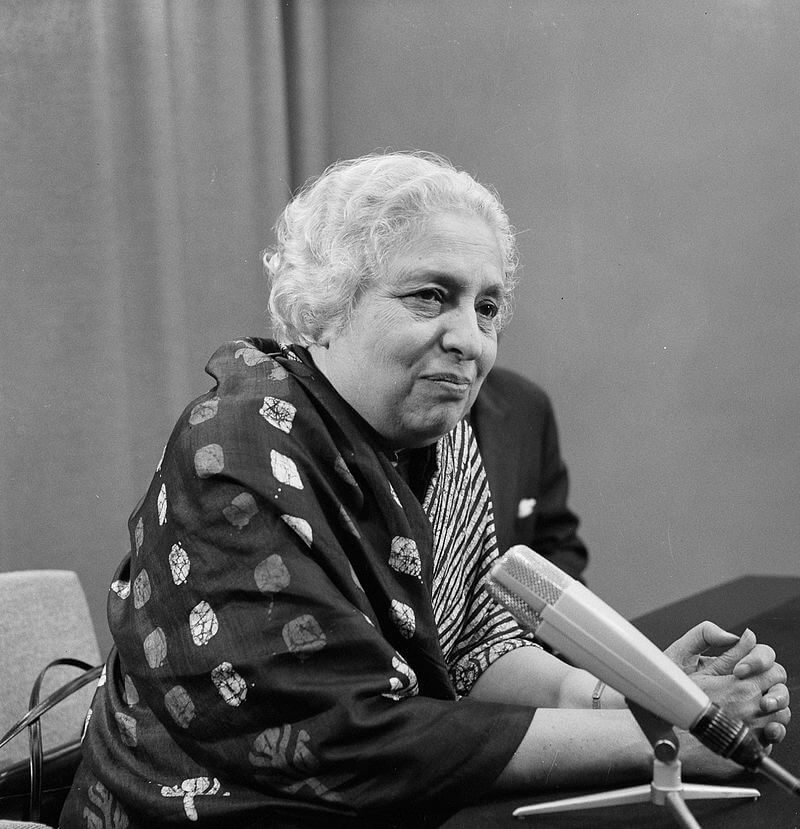
Vijaya Lakshmi Pandit in 1965 [Wikipedia]
“The more we sweat in peace, the less we bleed in war.”
~ Vijaya Lakshmi Pandit, Diplomat and Politician (1900 – 1990)

In St Stephen’s Green, Dublin, Ireland
Every breath that we draw, every thought of our brain, every instant of life proceed from God’s inexhaustible goodness. And if it be pain for a mother to be parted from her child, for a man to be exiled from hearth and home, for friend to be sundered from friend, O think what pain, what anguish, it must be for the poor soul to be spurned from the presence of the supremely good and loving Creator Who has called that soul into existence from nothingness and sustained it in life and loved it with an immeasurable love. This, then, to be separated for ever from its greatest good, from God, and to feel the anguish of that separation, knowing full well that it is unchangeable, this is the bearing, poena damni, the pain of loss.
~ A Portrait of the Artist as a Young Man by James Joyce (1882 – 1941) [Wikipedia]

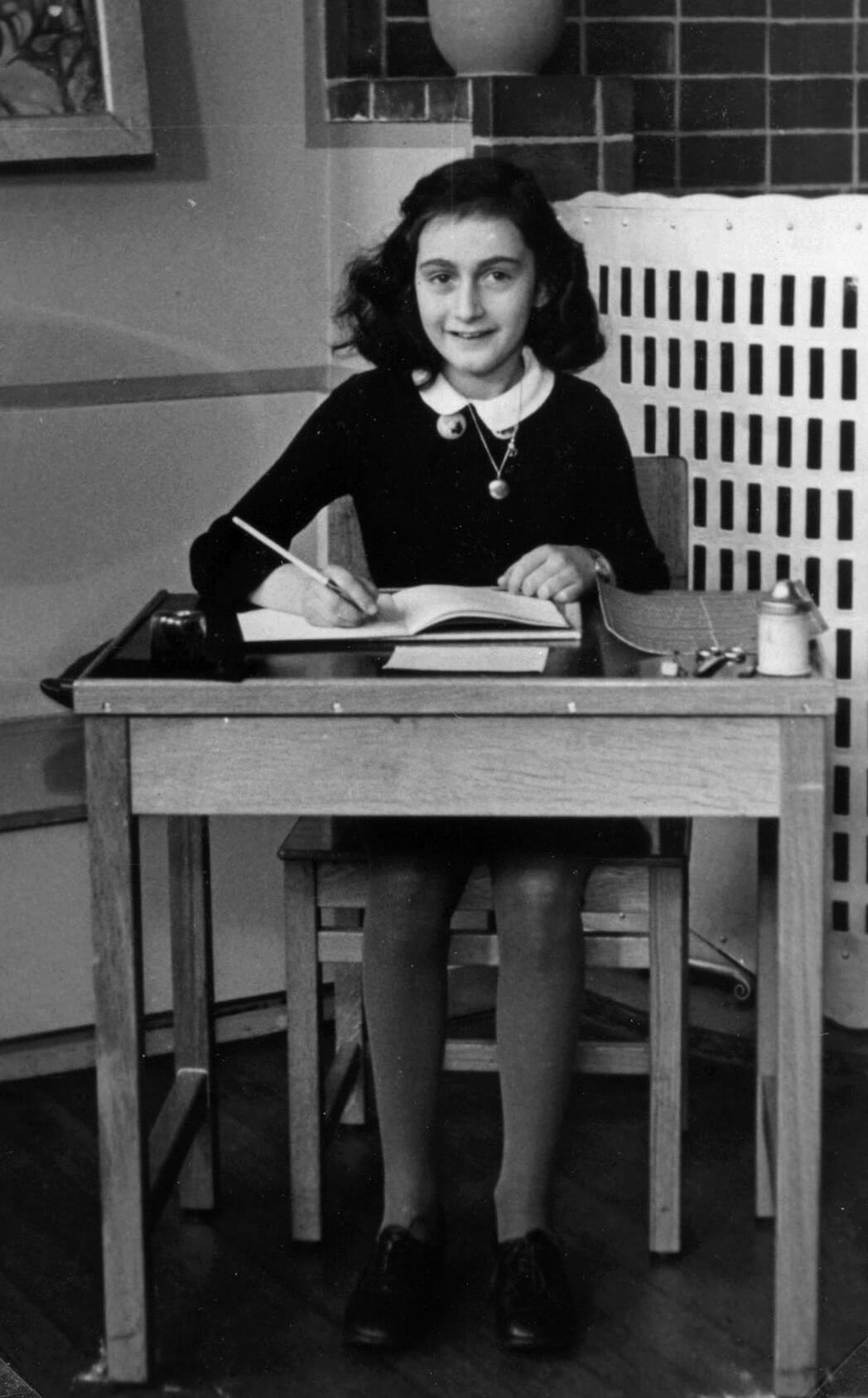
School photo of Anne Frank, 1941[Wikipedia]
I know what I want, I have a goal, an opinion, I have a religion and love. Let me be myself and then I am satisfied. I know that I’m a woman, a woman with inward strength and plenty of courage. If God lets me live… I shall not remain insignificant, I shall work in the world and for mankind! And now I know that first and foremost I shall require courage and cheerfulness.
– Anne Frank, Witness of the Holocaust (1929 – 1945)

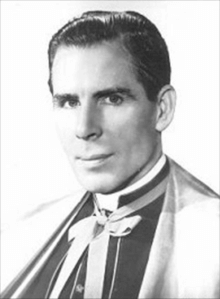
The Venerable Archbishop Fulton J. Sheen
A dying man asked a dying man for eternal life; a man without possessions asked a poor man for a kingdom . . . In the divine plan it was a thief who was the escort of the King of kings into paradise. If our Lord had come merely as a teacher, the thief would never have asked for forgiveness. But since the thief’s request touched the reason of his coming to earth, namely, to save souls, the thief heard the immediate answer. “I promise thee, this day thou shalt be with me in paradise” (Luke 23:43). It was the thief’s last prayer, perhaps even his first. He knocked once, sought once, asked once, dared everything, and found everything. When even the disciples were doubting and only one was present at the cross, the thief owned and acknowledged him as Savior.
The Venerable Archbishop Fulton J. Sheen (1895 – 1979)

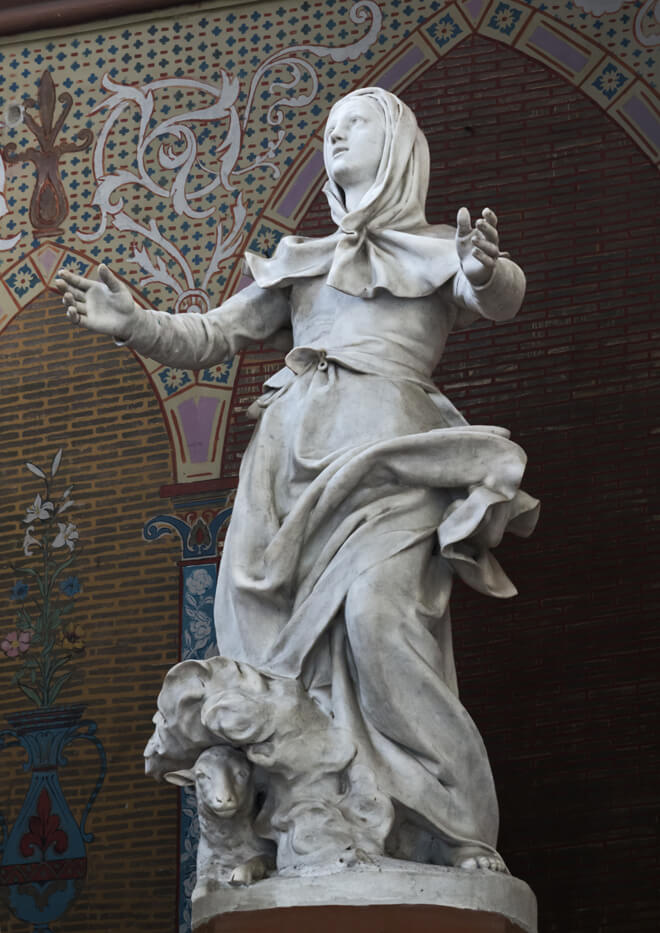
Statue of St Germaine Cousin, Pibrac, France [Wikipedia]
I have what God wished me to have, and I want no more.
~ St Germaine Cousin, Shepherdess (1579 – 1602)

Where is home? Who is my neighbour?
In this video Fr Patrick O’Shea, an Irish Columban based in New Zealand who spent the early years of his priesthood in Mindanao, reflects on the question ‘Where is Home?’ and on the consequence of the answer to that question in relation to another: ‘Who is my neighbour?’




